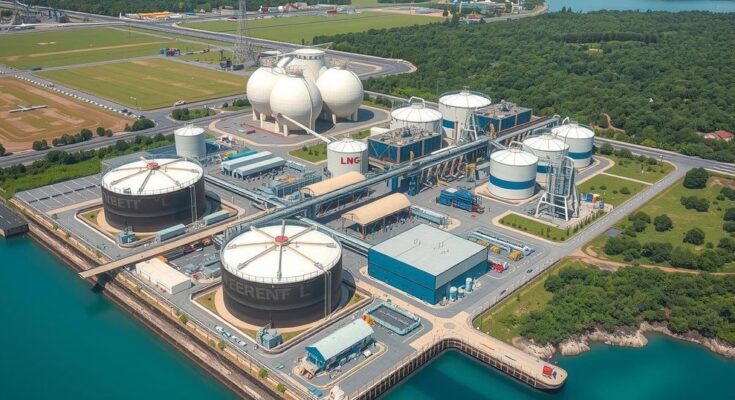The US Export-Import Bank has approved a US$4.7 billion loan for TotalEnergies’ Mozambique LNG project, crucial for overcoming obstacles posed by local terrorism. Initially supported in 2019, the project faced delays and security challenges, delaying construction until 2029. Despite commitments to cease overseas fossil fuel financing, EXIM’s backing could unlock additional funding, raising environmental and human rights concerns among activists and organizations.
TotalEnergies’ liquified natural gas (LNG) project in Mozambique will receive a US$4.7 billion loan from the US Export-Import Bank (EXIM), regarded as essential for the long-delayed initiative termed a “carbon bomb.” The project has faced significant setbacks due to insurgent terrorism in the region, which previously led to a suspension of construction following a severe attack. The estimated funding requirement for the project is around US$20 billion, with EXIM’s support deemed crucial to mobilizing further investments.
The initial funding commitment by EXIM dates back to 2019, during former President Donald Trump’s administration. However, subsequent violent incidents, particularly from Islamist terrorist groups, compelled TotalEnergies to withdraw from the project, pausing construction indefinitely. Plans to resume construction were postponed to 2029 due to ongoing security concerns and funding challenges, as the company navigated a complex landscape following a series of assaults.
Efforts by TotalEnergies’ CEO Patrick Pouyanné to secure funding from the Biden administration ultimately did not materialize. Nevertheless, after the board change back to Trump appointees, Pouyanné remarked that the agency was again operational, indicating an impending revival of support for fossil fuel projects despite pledges made at the COP26 summit to discontinue public financing of overseas fossil fuels.
There exists a notable contradiction within US policy, as the Biden administration’s efforts to align loan approvals with international climate commitments faced setbacks. This paradox is further exacerbated by the US and other OECD countries’ continued financial backing of fossil fuel initiatives, amounting to approximately US$40 billion annually, which raises concerns about climate ramifications linked to TotalEnergies’ project.
environmental activists have criticized the initiative as a flagrant misuse of taxpayer funds, calling it a catastrophic climate and human rights transgression. There are ongoing investigations against TotalEnergies regarding alleged failures to protect its local subcontractors during violent insurgent activities. Additionally, reports indicate severe human rights violations attributed to Mozambican forces that have prompted scrutiny and condemnation.
The substantial loan from the US Export-Import Bank for the TotalEnergies LNG project epitomizes a controversial commitment to fossil fuel developments amidst pressing climate concerns and human rights allegations. Despite earlier pledges to cease public financing for overseas fossil fuel endeavors, the renewed backing signals a complex interplay between economic interests and environmental responsibilities. Activist responses underscore the moral and fiscal implications of supporting such projects, highlighting the challenges facing sustainable investment in the region.
Original Source: macaonews.org




